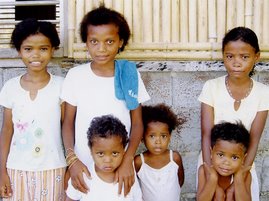The Avian Flu article presented for the case discussion presented some eye-opening worldwide implications of a potential pandemic and some recommendations which might help alleviate its impact on healthy and functioning societies all around. To piggyback on this issue, according to the WHO, we are currently at level 3 (no or very limited human-to-human transmission) of the global influenza preparedness plan.
As if this intermediate level of preparedness isn't already a cause for concern, the WHO has recently alerted the public that a H5N1 genetic mutation has been observed in Egypt in two related individuals. Both infected individuals were admitted to a hospital in mid-December of 2006, and were prescribed 2 tablets per day of Oseltamivir - an antiviral drug that is used in the treatment and prophylaxis of both Influenzavirus A and Influenzavirus B. However, laboratory testing has revealed moderately reduced susceptibility to Oseltamivir in both patients due to the genetically mutating virus. The infected pair died before even seeing the new year.
The WHO has not changed their antiviral treatment reommendations for individuals infected with H5N1, nor have they changed the level of preparedness. Moreover, these mutations show no indication of human-to-human transmissibility yet. However, this is how a pandemic starts - transmission from an animal vector to humans, antiviral resistance due to viral mutations, and finally, transmission between humans. It's rather unsettling to hear that the WHO has tackled awareness on such a small scale. The preliminary stages of an upcoming pandemic are clearly revealing themselves at an increasing rate. Why have they not taken further steps to alert everyone so that they may increase their level of preparedness or initiate a plan of action if one has not already been implemented? As Larry Brilliant said in his lecture on epidemics and pandemics, the key to eradicating disease and preventing potential pandemics is "Early detection [and] early response." The WHO has already detected the warning signs prior to an outbreak; what they need to do now is take more aggressive measures to prevent a future disaster from unfolding.
Link: http://www.who.int/csr/don/2007_01_18/en/index.html
Wednesday, January 24, 2007
Friday, January 19, 2007
Prevention vs. Treatment
The discussion this past week on the tensions between public health and physicians representing evidence-based medicine bothered me. True, there may be tensions regarding the methods to administer help, but the intentions should still be the same...to improve everyone's quality of life. There should be a balance between prevention and treatment, for not all diseases can be prevented. Instead, we should focus on people as a whole, who's quality of life can many times, determine health status. Here' s a couple good quotes that summarizes these intentions:
“The quality of life is more important than life itself”
~Alexis Carrel
"What's wrong with death sir? What are we so mortally afraid of? Why can't we treat death with a certain amount of humanity and dignity, and decency, and God forbid, maybe even humor. Death is not the enemy gentlemen. If we're going to fight a disease, let's fight one of the most terrible diseases of all, indifference. "
"A doctor's mission should not just be to prevent death, but also to improve the quality of life. That's why, you treat a disease...you win, you lose. You treat a person, I guarantee you, you'll win, no matter what the outcome."
~Patch Adams
“The quality of life is more important than life itself”
~Alexis Carrel
"What's wrong with death sir? What are we so mortally afraid of? Why can't we treat death with a certain amount of humanity and dignity, and decency, and God forbid, maybe even humor. Death is not the enemy gentlemen. If we're going to fight a disease, let's fight one of the most terrible diseases of all, indifference. "
"A doctor's mission should not just be to prevent death, but also to improve the quality of life. That's why, you treat a disease...you win, you lose. You treat a person, I guarantee you, you'll win, no matter what the outcome."
~Patch Adams
Wednesday, January 17, 2007
Ted Talks
This video was not 28 minutes...it felt like 5! Professor Rosling's lecture was so educational while being completely entertaining at the same time. I would first like to comment on his amazing ability to utilize computer animation to demonstrate trends in data. Secondly, aside from the obvious humor apparent in his comparison between the intelligence of Swedish students and chimpanzees, Rosling makes a notable observation. He blames this inadequacy not on ignorance, but on preconceived ideas. Each student, and everyone else for that matter, has certain experiences that lead them to believe things to be true. These preconceived beliefs influence one's so-called "educated" answer to the questions being dealt. Such is the case in the real world; educated persons impose their biases on an unknown subject. By bringing in previous outside knowledge, one can often be lead to formulating the wrong answer, which emphasizes the need for more education. Although, I do believe that, "Knowledge is power," I must point out that this inevitably leads to an endless cycle between education and biased opinions.
Rosling's demonstration on the strong linearity between countries' wealth (in dollars) and health (in rate of child survival) was right in line with the neverending discussion in our public health classes. We're constantly reintroduced to the idea the correlation between wealth or SES and health status. It was interesting to see however, how the linearity strengthens over time and also how it's spread across each country as well. Thus, health improvement must be highly contextualized.
"It's impossible, but we can't do it!" ...Enough said...
Link to video: http://www.ted.com/tedtalks/tedtalksplayer.cfm?key=hans_rosling&flashEnabled=1
Rosling's demonstration on the strong linearity between countries' wealth (in dollars) and health (in rate of child survival) was right in line with the neverending discussion in our public health classes. We're constantly reintroduced to the idea the correlation between wealth or SES and health status. It was interesting to see however, how the linearity strengthens over time and also how it's spread across each country as well. Thus, health improvement must be highly contextualized.
"It's impossible, but we can't do it!" ...Enough said...
Link to video: http://www.ted.com/tedtalks/tedtalksplayer.cfm?key=hans_rosling&flashEnabled=1
Inspiration
I had the chance to meet and talk with renowned plastic surgeon, Dr. Fereydoun Parsa, just last month, and found him to be absolutely inspiring. Not only is he an accomplished surgeon with his own practice, but he is the Chiefl of Plastic Surgery at the John A. Burns School of Medicine, has been invited to do numerous surgeries internationally, and provides free aid to underserved populations abroad. His entire family is involved with providing medical care in one way or another.
An article was written about him in 2004, which gives a glimpse into his philanthropic life. Relating to this class, the article is titled: Surgeon’s family spreads its wealth
Dr. Don Parsa's global humanitarian missions inspire his children to pursue careers in health. I would go even further to say that his work probably inspires many fellow healthcare professionals and hopefuls, alike, to provide aid around the world. What probably inspired me the most is his belief that, "Doctors should be able to travel without politically imposed boundaries. I feel where there's a need, one should be there to help." His heart is really in the right place, and I will continue to admire all his altruistic work.
The article can be found at: http://starbulletin.com/2004/08/22/news/story6.html
An article was written about him in 2004, which gives a glimpse into his philanthropic life. Relating to this class, the article is titled: Surgeon’s family spreads its wealth
Dr. Don Parsa's global humanitarian missions inspire his children to pursue careers in health. I would go even further to say that his work probably inspires many fellow healthcare professionals and hopefuls, alike, to provide aid around the world. What probably inspired me the most is his belief that, "Doctors should be able to travel without politically imposed boundaries. I feel where there's a need, one should be there to help." His heart is really in the right place, and I will continue to admire all his altruistic work.
The article can be found at: http://starbulletin.com/2004/08/22/news/story6.html
Monday, January 15, 2007
1st day of class
I'm a little overwhelmed with all the information at the moment. But I am also very excited to be taking this class. There seems to be a wealth of valuable information we will learn from this course, and it's all new to me. Here we go!
Subscribe to:
Comments (Atom)





